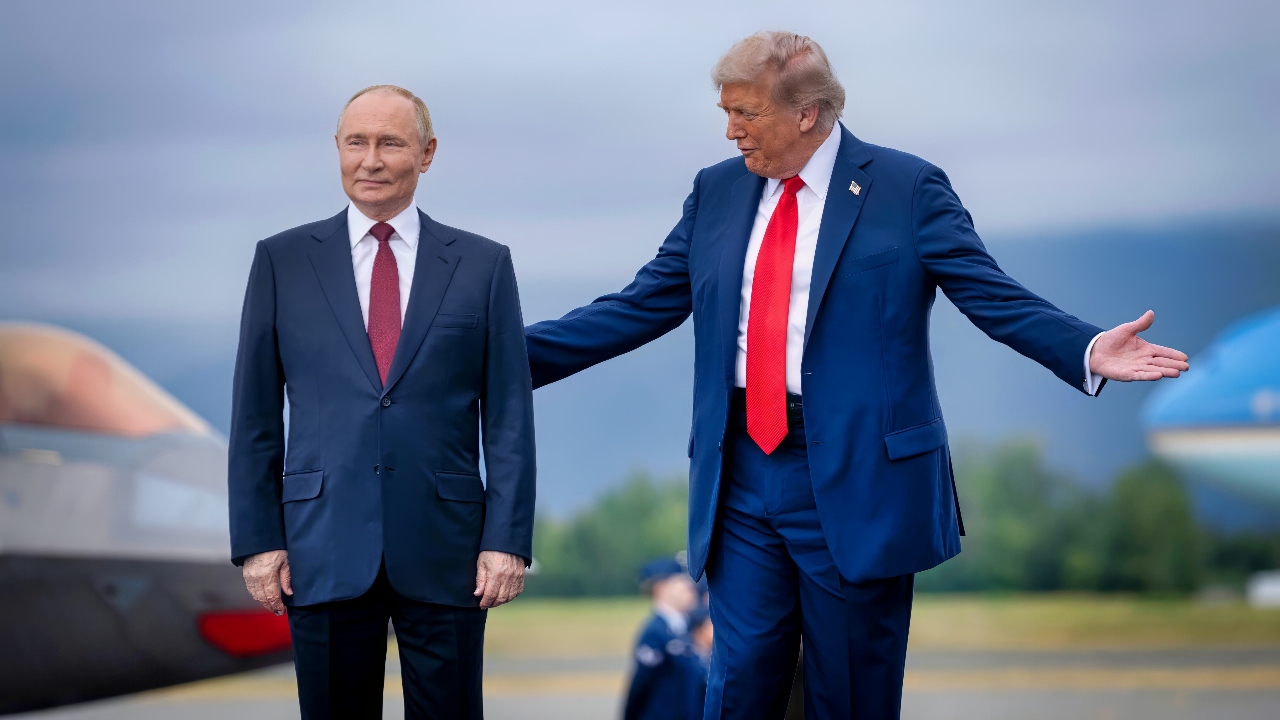Key Points and Summary – President Donald Trump has proposed a new plan to “freeze” the war in Ukraine, urging both sides to “cut and stop at the battle line” and negotiate a final settlement later.
-This proposal, Trump’s most concrete peace bid yet, has drawn cautious interest from Kyiv, with President Zelenskyy signaling the current line of contact could be a “starting point.”

President Donald J. Trump welcomes Russian President Vladimir Putin to Joint Base Elmendorf-Richardson, Anchorage, Alaska, August 15, 2025 (DoD photo by Benjamin Applebaum)
-However, the plan has met with rage from Moscow.
-Russian officials rejected the freeze, reiterating that any deal must recognize Russian sovereignty over the entire Donbas, including territory it has failed to conquer, leaving the peace process at a dead end.
Moscow Rages Over Trump’s Plan to Freeze Ukraine Frontline
President Donald Trump’s plans to “freeze” the Ukraine war at its current front lines has prompted cautious interest in Kyiv and among some European capitals — but not in Moscow.
The idea, which would effectively cement Russia’s control over occupied territories while halting further bloodshed, marks Trump’s most concrete bid yet to deliver the peace deal he once promised to broker “within 24 hours.”
Speaking aboard Air Force One on Sunday, Trump told reporters he had advised both sides to “cut and stop at the battle line,” arguing that future negotiations could determine the final borders. “It’s cut up right now,” he said. “I think 78 percent of the land is already taken by Russia. You leave it the way it is right now. They can negotiate something later on down the line.”
The U.S. president has rejected claims that he had pressured Ukrainian leader Volodymyr Zelenskyy to surrender the entire Donbas region.
Following an allegedly tense summit at the White House last week, leaders subsequently confirmed that the discussion centered on halting the war at existing battle lines rather than endorsing further Russian gains.
Under Trump’s proposal, fighting would stop across the four heavily contested Oblasts of Donetsk, Luhansk, Kherson, and Zaporizhia, where Russia currently controls most territory. Together, they make a strategic corridor linking the Donbas to Crimea, and include vital industrial and energy assets such as the Zaporizhia nuclear power plant.
Zelenskyy, who has long vowed to restore all of Ukraine’s 1991 borders, appeared more conciliatory this week. Alongside several European leaders, he signed a statement describing the “current line of contact” as a possible starting point for peace negotiations. That marks a significant rhetorical shift from Kyiv’s earlier insistence on total territorial restoration before talks could begin.
Yet Trump’s plan faces a hard stop in Moscow. Russian Foreign Minister Sergey Lavrov has complained that a ceasefire on such terms “Would mean only one thing: a large part of Ukraine would remain under Nazi rule,” reiterating that any settlement must recognize Russian sovereignty over all occupied areas.
Russia Does Not Like This Ukraine Deal
Kremlin spokesperson Dmitry Peskov was even blunter, insisting that Russia’s demands “do not change.” Reuters also reports that Moscow privately informed Washington that it expects control of the entire Donbas, including the parts it has failed to seize.
A planned Trump–Putin summit in Budapest was shelved this week, with Trump saying he saw no point in a “wasted meeting.” In recent weeks, Trump has dramatically oscillated between suggesting “land swaps” and claiming Ukraine “could still win” its war outright.
While his latest freeze proposal would indeed stop the killing in the short term, it risks solidifying Russia’s land grab and leaving millions of Ukrainians stranded behind enemy lines.
If one thing is clear, it is that no peace deal of any kind is yet in sight.
About the Author: Georgia Gilholy
Georgia Gilholy is a journalist based in the United Kingdom who has been published in Newsweek, The Times of Israel, and the Spectator. Gilholy writes about international politics, culture, and education. You can follow her on X: @llggeorgia.
More Military
The Los Angeles-Class Submarine Has a Message for the U.S. Navy
‘Never See It Coming’: A First Look at the NGAD F-47’s Bomber-Like Stealth
The Real Reason U.S. Military Recruiting Numbers Are Surging
The Midway-Class Aircraft Carrier Has a Message for Every Navy on Earth
The YF-23 Black Widow II Stealth Fighter Still Haunts the U.S. Air Force










